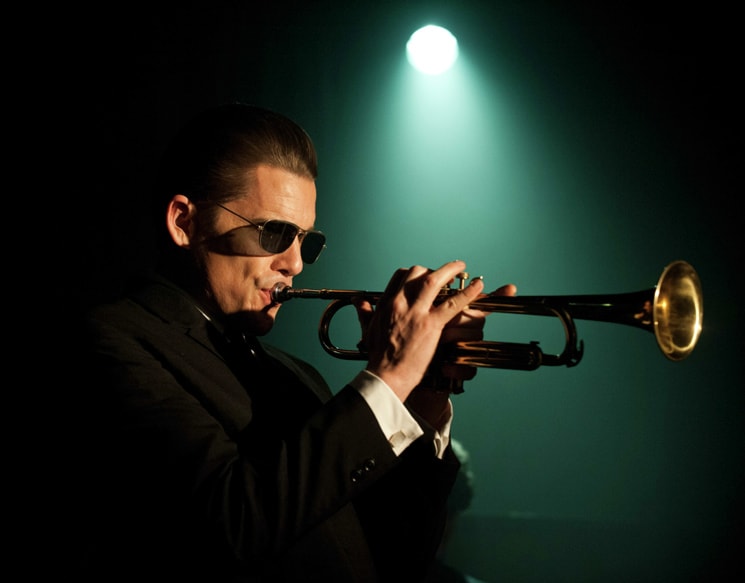Most major musicians hold an almost mythical status among the greater population — even for Academy Award-nominated actors like Ethan Hawke.
Having already released his directorial debut documentary Seymour: An Introduction — a film chronicling the life of acclaimed jazz pianist Seymour Bernstein — earlier this year, Hawke returns in the front of the camera in Born to Be Blue, Canadian filmmaker Robert Budreau's semi-factual, semi-fictional biopic profiling West coast jazz trumpeter and vocalist Chet Baker during one of the lowest points of his career.
The film starts off in a foreign jail cell. Without a penny to his name and (seemingly) being past the prime of his career, Baker finds himself in the unique position of being at the whim of a big-budget film company after being rescued from the prison by a director who has decided to make a movie about his life as a musician. A career Romeo, Baker begins a love affair with one of the film's leads (Carmen Ejogo, doing double-duty as his off-screen ex-wife/on-screen future wife), who soon lays witness to his brutal beating outside a bowling alley by a trio of drug dealers he owes money to.
With a broken jaw and some unseemly effects from years of drug abuse, Baker attempts to rehabilitate himself — both physically and as a public performer — with the help of his romantic partner and tries to overcome his old habits.
According to Variety, Hawke was drawn, at least in part, to the role after dealing with the loss of two brilliant performers and friends of his — River Phoenix (in 1993) and Philip Seymour Hoffman (2014) — to addiction. It's a fitting role for someone who personally knows the grief brought on by the passing of greats, and Hawke plays Baker beautifully, delivering his soft-spoken, at times awkward and uncomfortable lines as if he were trying to convince Dizzy Gillespie himself that he's miles ahead of the rest.
Born to Be Blue is pretty standard stuff story wise, and has all the trappings of other independent, music-based biopics (limited locations, muted set designs, a lack of characters), but is successful at conveying the anguish that comes from somebody creative trying to be the best. It also perfectly encapsulates the black and white divide found in the jazz scene at the time and how Charlie Parker's addiction ultimately affected thousands of artists uncomfortable in their own skin looking to cut corners and land a rung above the rest.
Born to Be Blue ends with a mixed message about the role drugs play in creativity, but the ideas it raises about finding and dealing with success as an artist are rather interesting. Also, the fact that it was filmed in Sudbury, ON is pretty cool.
(eOne)Having already released his directorial debut documentary Seymour: An Introduction — a film chronicling the life of acclaimed jazz pianist Seymour Bernstein — earlier this year, Hawke returns in the front of the camera in Born to Be Blue, Canadian filmmaker Robert Budreau's semi-factual, semi-fictional biopic profiling West coast jazz trumpeter and vocalist Chet Baker during one of the lowest points of his career.
The film starts off in a foreign jail cell. Without a penny to his name and (seemingly) being past the prime of his career, Baker finds himself in the unique position of being at the whim of a big-budget film company after being rescued from the prison by a director who has decided to make a movie about his life as a musician. A career Romeo, Baker begins a love affair with one of the film's leads (Carmen Ejogo, doing double-duty as his off-screen ex-wife/on-screen future wife), who soon lays witness to his brutal beating outside a bowling alley by a trio of drug dealers he owes money to.
With a broken jaw and some unseemly effects from years of drug abuse, Baker attempts to rehabilitate himself — both physically and as a public performer — with the help of his romantic partner and tries to overcome his old habits.
According to Variety, Hawke was drawn, at least in part, to the role after dealing with the loss of two brilliant performers and friends of his — River Phoenix (in 1993) and Philip Seymour Hoffman (2014) — to addiction. It's a fitting role for someone who personally knows the grief brought on by the passing of greats, and Hawke plays Baker beautifully, delivering his soft-spoken, at times awkward and uncomfortable lines as if he were trying to convince Dizzy Gillespie himself that he's miles ahead of the rest.
Born to Be Blue is pretty standard stuff story wise, and has all the trappings of other independent, music-based biopics (limited locations, muted set designs, a lack of characters), but is successful at conveying the anguish that comes from somebody creative trying to be the best. It also perfectly encapsulates the black and white divide found in the jazz scene at the time and how Charlie Parker's addiction ultimately affected thousands of artists uncomfortable in their own skin looking to cut corners and land a rung above the rest.
Born to Be Blue ends with a mixed message about the role drugs play in creativity, but the ideas it raises about finding and dealing with success as an artist are rather interesting. Also, the fact that it was filmed in Sudbury, ON is pretty cool.
